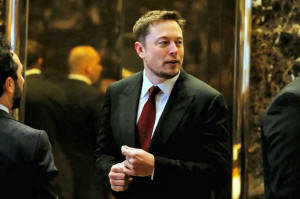|
Elon Musk on mission to link human brains
with computers in four years: report
 Send a link to a friend
Send a link to a friend
 [April 21, 2017]
(Reuters) - Tesla Inc <TSLA.O>
founder and Chief Executive Elon Musk said his latest company Neuralink
Corp is working to link the human brain with a machine interface by
creating micron-sized devices. [April 21, 2017]
(Reuters) - Tesla Inc <TSLA.O>
founder and Chief Executive Elon Musk said his latest company Neuralink
Corp is working to link the human brain with a machine interface by
creating micron-sized devices.
Neuralink is aiming to bring to the market a product that helps with
certain severe brain injuries due to stroke, cancer lesion etc, in about
four years, Musk said in an interview with website Wait But Why.
"If I were to communicate a concept to you, you would essentially engage
in consensual telepathy," Musk said in the interview published on
Thursday. http://bit.ly/2oWJcMw
Artificial intelligence and machine learning will create computers so
sophisticated and godlike that humans will need to implant "neural
laces" in their brains to keep up, Musk said in a tech conference last
year.

"There are a bunch of concepts in your head that then your brain has to
try to compress into this incredibly low data rate called speech or
typing," Musk said in the latest interview.
"If you have two brain interfaces, you could actually do an uncompressed
direct conceptual communication with another person."
The technology could take about eight to 10 years to become usable by
people with no disability, which would depend heavily on regulatory
approval timing and how well the devices work on people with
disabilities, Musk was quoted as saying.
[to top of second column] |

Tesla Chief Executive, Elon Musk enters the lobby of Trump Tower in
Manhattan, New York, U.S., January 6, 2017. REUTERS/Shannon
Stapleton/File Photo

In March, the Wall Street Journal reported that Musk had launched a
company through which computers could merge with human brains.
Neuralink was registered in California as a "medical research"
company last July, and he plans on funding the company mostly by
himself.
(Reporting by Abinaya Vijayaraghavan in Bengaluru; Editing by
Gopakumar Warrier)
[© 2017 Thomson Reuters. All rights
reserved.]
Copyright 2017 Reuters. All rights reserved. This material may not be published,
broadcast, rewritten or redistributed.
 |